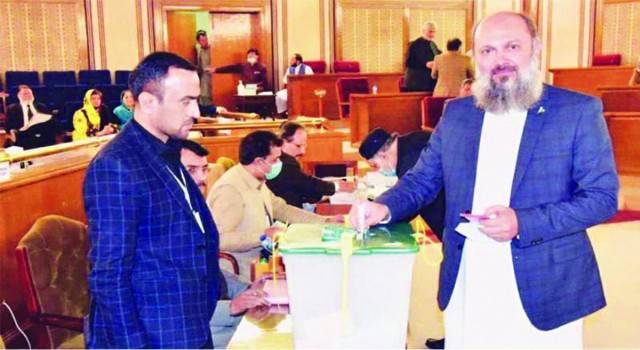
In the Senate polls held on March 3, the coalition led by Balochistan Awami Party (BAP) dominated the elections by winning eight of 12 seats. This came as a surprise because the opposition was expecting to win at least five seats and was canvassing for the sixth seat as well. However, maneuvering by BAP leaders Chief Minister Jam Kamal and Chairman Senate Sadiq Sanjrani got the best of the opposition.
According to unofficial results, BAP won six seats. Pakistan Tehreek-i-Insaf (PTI) did not win a single seat as the party withdrew its candidate in favor of independent candidate Abdul Qadir, who won the elections. Awami National Party (ANP), a member of the ruling coalition in Balochistan, also won a seat thanks to the support of BAP. From the opposition, JUI-F won two seats and BNP-Mengal won one seat. An independent candidate Naseema Ehsaan, who joined BNP-Mengal on Tuesday, also secured a place in the Upper House.
A few days before the election, Sadiq Sanjrani visited Quetta to campaign for BAP candidates. During his visit, he offered a deal to the opposition. Sanjrani offered four seats and asked eight for the ruling coalition. If the opposition agreed to this, then additional candidates had to be withdrawn and candidates would be elected unopposed, like in the Punjab. The over-confident opposition led by Sardar Akhtar Mengal rejected the offer and asked for six seats. However, the results of the Senate polls proved Sanjrani to be the stronger player.
The election result has increased the number of BAP senators to 13 in the Upper House. BAP will continue to be a leading party in the Senate of Pakistan. It is likely that Sanjrani will once again be a candidate for the chairmanship of the Senate and he can win if the government manages to get a few votes for him from the opposition, just like the 2019 vote of no-confidence motion.
This scribe predicted the outcome of Senate elections in these pages on February 19. I wrote at the time that if the ruling coalition members vote firmly according to the party line and all smaller coalition partners like ANP are entertained, then they can expect to win eight Senate seats and four will go to the opposition. This proved to be true and the government coalition won eight seats in the Senate polls. It also proved the assertion that the provincial government coalition is united and they voted in an organized manner, unlike the government coalition in National Assembly where Hafeez Sheikh lost to Yousaf Raza Gillani.
The outcome of the Senate elections was not free from shocks and surprises. Abdul Qadir, the controversial Islamabad-based billionaire, won a general seat as an independent. Surprisingly, there is only one independent member of the assembly who is also supporting the opposition. So, BAP and PTI voted for him and that was against the spirit of party-based democracy when these two parties could not find someone to contest elections from their tickets.
BNP-Mengal chose to vote for Naseema Ehsaan, who had joined the party just a day before the elections. BNP-Mengal ignored two long-time party workers who were also contenders for senate elections on women’s seats. BNP-Mengal had the numbers to elect women candidates from its old guard but due to reasons unknown, the party leadership went for the new entrant.
BNP-Mengal had also announced to elect Sajid Tareen advocate as a senator but in a last-minute change, Qasim Roonjha was voted to victory by BNP-Mengal. The election of Sajid Tareen would have proven BNP-Mengal’s credentials as a joint party of Baloch and Pashtuns, but the last-minute chance torpedoed this accomplishment. Another surprise is the election of an ANP senator with the help of BAP and PTI from Balochistan. Since ANP is a part of the PDM at the center, this senator will be part of the opposition in the Senate and vote against PTI and BAP, which helped in his elections.
The Senate election results from Balochistan have shown two things about the stability of the current government. First, that the ruling coalition is united and intact. All parties of the ruling coalition including a member of the Jamhoori Watan party voted as per the directions of the ruling coalition. Reportedly, not a single vote of the government was wasted. This result destroyed the idea that there are divisions within BAP and rifts between BAP and PTI. Jam Kamal’s government looks strong and is expected to complete its tenure without any major issues.
The election results have also shown the opposition is divided and not on the same page. Nawab Sanaullah Zehri, who sits on opposition benches, voted for government coalition candidates, according to Jam Kamal. Moreover, opposition members voted their votes on general seats due to ill-planning. Abdul Ghafoor Haideri got 11 votes while he could have easily won using eight votes of first priority just like the senators of BAP. Due to this ill-planning, opposition lost the chance to win an extra seat in the general category.
The implication of this division or lack of coordination is that the opposition will not pose a major threat to Jam Kamal; they can neither topple his government nor can they block legislation. So, unlike the PTI government in the center, Senate elections have strengthened Jam Kamal’s government in Balochistan.
The writer is a journalist and researcher. He can be reached on Twitter: @iAdnanAamir

According to unofficial results, BAP won six seats. Pakistan Tehreek-i-Insaf (PTI) did not win a single seat as the party withdrew its candidate in favor of independent candidate Abdul Qadir, who won the elections. Awami National Party (ANP), a member of the ruling coalition in Balochistan, also won a seat thanks to the support of BAP. From the opposition, JUI-F won two seats and BNP-Mengal won one seat. An independent candidate Naseema Ehsaan, who joined BNP-Mengal on Tuesday, also secured a place in the Upper House.
A few days before the election, Sadiq Sanjrani visited Quetta to campaign for BAP candidates. During his visit, he offered a deal to the opposition. Sanjrani offered four seats and asked eight for the ruling coalition. If the opposition agreed to this, then additional candidates had to be withdrawn and candidates would be elected unopposed, like in the Punjab. The over-confident opposition led by Sardar Akhtar Mengal rejected the offer and asked for six seats. However, the results of the Senate polls proved Sanjrani to be the stronger player.
The election result has increased the number of BAP senators to 13 in the Upper House. BAP will continue to be a leading party in the Senate of Pakistan. It is likely that Sanjrani will once again be a candidate for the chairmanship of the Senate and he can win if the government manages to get a few votes for him from the opposition, just like the 2019 vote of no-confidence motion.
This scribe predicted the outcome of Senate elections in these pages on February 19. I wrote at the time that if the ruling coalition members vote firmly according to the party line and all smaller coalition partners like ANP are entertained, then they can expect to win eight Senate seats and four will go to the opposition. This proved to be true and the government coalition won eight seats in the Senate polls. It also proved the assertion that the provincial government coalition is united and they voted in an organized manner, unlike the government coalition in National Assembly where Hafeez Sheikh lost to Yousaf Raza Gillani.
The opposition will not pose a major threat to Jam Kamal; they can neither topple his government nor can they block legislation
The outcome of the Senate elections was not free from shocks and surprises. Abdul Qadir, the controversial Islamabad-based billionaire, won a general seat as an independent. Surprisingly, there is only one independent member of the assembly who is also supporting the opposition. So, BAP and PTI voted for him and that was against the spirit of party-based democracy when these two parties could not find someone to contest elections from their tickets.
BNP-Mengal chose to vote for Naseema Ehsaan, who had joined the party just a day before the elections. BNP-Mengal ignored two long-time party workers who were also contenders for senate elections on women’s seats. BNP-Mengal had the numbers to elect women candidates from its old guard but due to reasons unknown, the party leadership went for the new entrant.
BNP-Mengal had also announced to elect Sajid Tareen advocate as a senator but in a last-minute change, Qasim Roonjha was voted to victory by BNP-Mengal. The election of Sajid Tareen would have proven BNP-Mengal’s credentials as a joint party of Baloch and Pashtuns, but the last-minute chance torpedoed this accomplishment. Another surprise is the election of an ANP senator with the help of BAP and PTI from Balochistan. Since ANP is a part of the PDM at the center, this senator will be part of the opposition in the Senate and vote against PTI and BAP, which helped in his elections.
The Senate election results from Balochistan have shown two things about the stability of the current government. First, that the ruling coalition is united and intact. All parties of the ruling coalition including a member of the Jamhoori Watan party voted as per the directions of the ruling coalition. Reportedly, not a single vote of the government was wasted. This result destroyed the idea that there are divisions within BAP and rifts between BAP and PTI. Jam Kamal’s government looks strong and is expected to complete its tenure without any major issues.
The election results have also shown the opposition is divided and not on the same page. Nawab Sanaullah Zehri, who sits on opposition benches, voted for government coalition candidates, according to Jam Kamal. Moreover, opposition members voted their votes on general seats due to ill-planning. Abdul Ghafoor Haideri got 11 votes while he could have easily won using eight votes of first priority just like the senators of BAP. Due to this ill-planning, opposition lost the chance to win an extra seat in the general category.
The implication of this division or lack of coordination is that the opposition will not pose a major threat to Jam Kamal; they can neither topple his government nor can they block legislation. So, unlike the PTI government in the center, Senate elections have strengthened Jam Kamal’s government in Balochistan.
The writer is a journalist and researcher. He can be reached on Twitter: @iAdnanAamir


